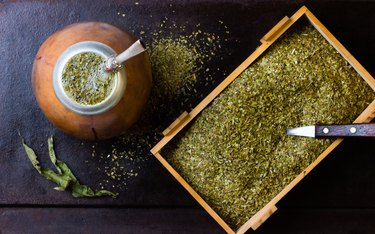
The eye-opening qualities of coffee may be beloved by its admirers, but a cup of joe is not the only cup that provides a wake-up call for the brain. Yerba mate, a traditional South American beverage, offers non-coffee drinkers a caffeine-enriched alternative. Both drinks may provide some health benefits but should be consumed in moderation.
Tip
Yerba mate and coffee are caffeinated beverages that offer some health benefits due to polyphenols.
Video of the Day
Yerba Mate vs. Coffee: Benefits
Yerba mate is a tea-like beverage made from the leaves of an evergreen tree native to South America. According to a November 2018 review published in the journal Nutrients, yerba mate is rich in polyphenols that confer antioxidant and antibacterial properties. Other potential health benefits of yerba mate include reducing triglycerides and LDL cholesterol, stabilizing blood glucose levels and promoting weight loss due to decreased appetite.
Video of the Day
Coffee also contains beneficial polyphenols that offer perks like those offered by yerba mate. Regular coffee drinkers are less likely to develop type 2 diabetes, and greater consumption correlates to a reduced risk of diabetes, according to Oregon State University's Linus Pauling Institute.
Men who drink a lot of coffee may also have a reduced risk of Parkinson's disease, reports the Linus Pauling Institute. Coffee consumption may also be associated with a reduced risk of certain cancers such as colon, liver, endometrial and prostate cancers. Antioxidants in coffee help to counteract inflammation and the effects of aging caused by free radicals.
Yerba Mate vs. Coffee: Caffeine
An 8-ounce cup of coffee contains 72 to 130 milligrams of caffeine, depending on the type of coffee and how it is brewed. Yerba mate contains slightly less caffeine than coffee, according to a still-cited 2007 analysis published in the October 2007 edition of Journal of Food Science.
Like coffee, the caffeine in yerba mate can improve mental acuity and promote alertness, due to its stimulant effect on the nervous system. Caffeine can also improve athletic performance, including speed, strength and endurance.
The U.S. Food and Drug Administration recommends consuming no more than 400 milligrams of caffeine per day, which translates to less than 40 ounces of yerba mate or four to five cups of coffee. Too much caffeine can cause jitteriness, difficulty sleeping, nausea and increased heart rate.
Yerba Mate and Cancer
Conflicting evidence makes it unclear whether yerba mate offers cancer-fighting protection or increases the risk of cancer. Yerba mate contains some potentially carcinogenic compounds that may cause esophageal cancer when consumed frequently at high temperatures.
However, yerba mate also contains compounds that inhibit the spread of cancer cells and encourage cancer cell death. However, yerba mate's anti-inflammatory properties may also help to inhibit the growth of cancerous cells.
Caffeine and Nutrient Absorption
The Linus Pauling Institute reports that caffeine in coffee inhibits the absorption of calcium, which could potentially lead to bone loss and an increased risk of fractures. Limiting consumption to three or fewer cups per day while boosting calcium intake can decrease the negative effects on calcium absorption. Other organic compounds in coffee can interfere with iron absorption. These prevent the absorption of plant-based sources of iron in the small intestine. Refrain from drinking coffee while eating iron-rich foods to maximize iron absorption.
Read more: Iron Deficiency and Caffeine
Too Much Caffeine?
Caffeine in coffee and yerba mate offers benefits, but too much can cause negative effects. The FDA advises that caffeine can become habit forming, and going without it can trigger withdrawal symptoms, such as headaches or anxiety. Caffeine can also negatively interact with some medications.
People who are sensitive to the effects of caffeine or want to cut down on their caffeine intake can increase their energy level with caffeine-free energy drinks, a vitamin B supplement, a carb- or protein-rich snack or simply staying hydrated with a tall glass of water.
- Nutrients: "Health Benefits of Bioactive Compounds From the Genus Ilex, a Source of Traditional Caffeinated Beverages"
- Mayo Clinic: "A Friend Suggested That I Try Yerba Mate Tea to Boost My Energy. What Is Yerba Mate?"
- Oregon State University: Linus Pauling Institute: "Coffee"
- U.S. Food and Drug Administration: "Spilling the Beans: How Much Caffeine Is Too Much?"
- Journal of Food Science: "Yerba Mate Tea (Ilex paraguariensis): A Comprehensive Review on Chemistry, Health Implications, and Technological Considerations"